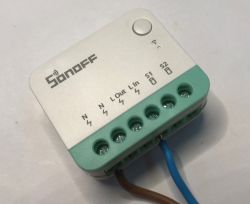Hi! Here is a teardown of a random super generic temperature and humdity sensor from aliexpress.
Bought From:
https://de.aliexpress.com/item/1005004854419532.html
Wifi Version, really quick delivery to austia ~ 2 weeks
Pictures:
![[BK7231N CBU] Generic Temperature and Humidity Sensor [BK7231N CBU] Generic Temperature and Humidity Sensor](https://obrazki.elektroda.pl/9205540100_1672573268_thumb.jpg)
![[BK7231N CBU] Generic Temperature and Humidity Sensor [BK7231N CBU] Generic Temperature and Humidity Sensor](https://obrazki.elektroda.pl/3688232400_1672573267_thumb.jpg)
![[BK7231N CBU] Generic Temperature and Humidity Sensor [BK7231N CBU] Generic Temperature and Humidity Sensor](https://obrazki.elektroda.pl/1491600200_1672573267_thumb.jpg)
![[BK7231N CBU] Generic Temperature and Humidity Sensor [BK7231N CBU] Generic Temperature and Humidity Sensor](https://obrazki.elektroda.pl/4407107500_1672573270_thumb.jpg)
![[BK7231N CBU] Generic Temperature and Humidity Sensor [BK7231N CBU] Generic Temperature and Humidity Sensor](https://obrazki.elektroda.pl/6717870400_1672573271_thumb.jpg)
![[BK7231N CBU] Generic Temperature and Humidity Sensor [BK7231N CBU] Generic Temperature and Humidity Sensor](https://obrazki.elektroda.pl/9824740100_1672573271_thumb.jpg)
Device Pinout:
![[BK7231N CBU] Generic Temperature and Humidity Sensor [BK7231N CBU] Generic Temperature and Humidity Sensor](https://obrazki.elektroda.pl/7486776200_1672573541_thumb.jpg)
Datasheets:
uC: https://developer.tuya.com/en/docs/iot/cbu-module-datasheet?id=Ka07pykl5dk4u
SHT30: https://sensirion.com/media/documents/213E6A3B/63A5A569/Datasheet_SHT3x_DIS.pdf
Specific Device ID: SHT30 DIAS7M
Flashing:
![[BK7231N CBU] Generic Temperature and Humidity Sensor [BK7231N CBU] Generic Temperature and Humidity Sensor](https://obrazki.elektroda.pl/6478609200_1672573656_thumb.jpg)
I could flash latest BK7231N Image via console.
![[BK7231N CBU] Generic Temperature and Humidity Sensor [BK7231N CBU] Generic Temperature and Humidity Sensor](https://obrazki.elektroda.pl/2510941700_1672573904_thumb.jpg)
Config:
![[BK7231N CBU] Generic Temperature and Humidity Sensor [BK7231N CBU] Generic Temperature and Humidity Sensor](https://obrazki.elektroda.pl/9126940800_1672573716_thumb.jpg)
Driver for SHT30 is missing but i have created a github issue:
https://github.com/openshwprojects/OpenBK7231T_App/issues/574
Bought From:
https://de.aliexpress.com/item/1005004854419532.html
Wifi Version, really quick delivery to austia ~ 2 weeks
Pictures:
![[BK7231N CBU] Generic Temperature and Humidity Sensor [BK7231N CBU] Generic Temperature and Humidity Sensor](https://obrazki.elektroda.pl/9205540100_1672573268_thumb.jpg)
![[BK7231N CBU] Generic Temperature and Humidity Sensor [BK7231N CBU] Generic Temperature and Humidity Sensor](https://obrazki.elektroda.pl/3688232400_1672573267_thumb.jpg)
![[BK7231N CBU] Generic Temperature and Humidity Sensor [BK7231N CBU] Generic Temperature and Humidity Sensor](https://obrazki.elektroda.pl/1491600200_1672573267_thumb.jpg)
![[BK7231N CBU] Generic Temperature and Humidity Sensor [BK7231N CBU] Generic Temperature and Humidity Sensor](https://obrazki.elektroda.pl/4407107500_1672573270_thumb.jpg)
![[BK7231N CBU] Generic Temperature and Humidity Sensor [BK7231N CBU] Generic Temperature and Humidity Sensor](https://obrazki.elektroda.pl/6717870400_1672573271_thumb.jpg)
![[BK7231N CBU] Generic Temperature and Humidity Sensor [BK7231N CBU] Generic Temperature and Humidity Sensor](https://obrazki.elektroda.pl/9824740100_1672573271_thumb.jpg)
Device Pinout:
![[BK7231N CBU] Generic Temperature and Humidity Sensor [BK7231N CBU] Generic Temperature and Humidity Sensor](https://obrazki.elektroda.pl/7486776200_1672573541_thumb.jpg)
Datasheets:
uC: https://developer.tuya.com/en/docs/iot/cbu-module-datasheet?id=Ka07pykl5dk4u
SHT30: https://sensirion.com/media/documents/213E6A3B/63A5A569/Datasheet_SHT3x_DIS.pdf
Specific Device ID: SHT30 DIAS7M
Flashing:
![[BK7231N CBU] Generic Temperature and Humidity Sensor [BK7231N CBU] Generic Temperature and Humidity Sensor](https://obrazki.elektroda.pl/6478609200_1672573656_thumb.jpg)
I could flash latest BK7231N Image via console.
Config:
![[BK7231N CBU] Generic Temperature and Humidity Sensor [BK7231N CBU] Generic Temperature and Humidity Sensor](https://obrazki.elektroda.pl/9126940800_1672573716_thumb.jpg)
Driver for SHT30 is missing but i have created a github issue:
https://github.com/openshwprojects/OpenBK7231T_App/issues/574
Cool? Ranking DIY







![[BK7231N CBU] Generic Temperature and Humidity Sensor [BK7231N CBU] Generic Temperature and Humidity Sensor](https://obrazki.elektroda.pl/7729655700_1672574400_thumb.jpg)
![[BK7231N CBU] Generic Temperature and Humidity Sensor [BK7231N CBU] Generic Temperature and Humidity Sensor](https://obrazki.elektroda.pl/2916978000_1672574576_thumb.jpg)
![[BK7231N CBU] Generic Temperature and Humidity Sensor [BK7231N CBU] Generic Temperature and Humidity Sensor](https://obrazki.elektroda.pl/8247088700_1672574805_thumb.jpg)
![[BK7231N CBU] Generic Temperature and Humidity Sensor [BK7231N CBU] Generic Temperature and Humidity Sensor](https://obrazki.elektroda.pl/4105339300_1672574959_thumb.jpg)
![[BK7231N CBU] Generic Temperature and Humidity Sensor [BK7231N CBU] Generic Temperature and Humidity Sensor](https://obrazki.elektroda.pl/8109819400_1673043809_thumb.jpg)
![[BK7231N CBU] Generic Temperature and Humidity Sensor [BK7231N CBU] Generic Temperature and Humidity Sensor](https://obrazki.elektroda.pl/8972722500_1673707857_thumb.jpg)
![[BK7231N CBU] Generic Temperature and Humidity Sensor [BK7231N CBU] Generic Temperature and Humidity Sensor](https://obrazki.elektroda.pl/2617583000_1673796073_thumb.jpg)
![[BK7231N CBU] Generic Temperature and Humidity Sensor [BK7231N CBU] Generic Temperature and Humidity Sensor](https://obrazki.elektroda.pl/9879827700_1673859980_thumb.jpg)